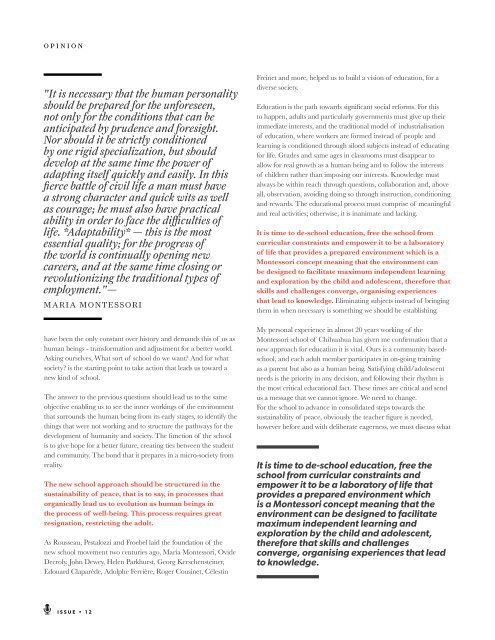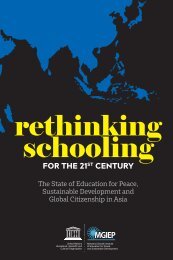The Blue DOT - 12: Reimagining Learning Spaces for Uncertain Times
You also want an ePaper? Increase the reach of your titles
YUMPU automatically turns print PDFs into web optimized ePapers that Google loves.
"It is necessary that the human personality<br />
should be prepared <strong>for</strong> the un<strong>for</strong>eseen,<br />
not only <strong>for</strong> the conditions that can be<br />
anticipated by prudence and <strong>for</strong>esight.<br />
Nor should it be strictly conditioned<br />
by one rigid specialization, but should<br />
develop at the same time the power of<br />
adapting itself quickly and easily. In this<br />
fierce battle of civil life a man must have<br />
a strong character and quick wits as well<br />
as courage; he must also have practical<br />
ability in order to face the difficulties of<br />
life. *Adaptability* — this is the most<br />
essential quality; <strong>for</strong> the progress of<br />
the world is continually opening new<br />
careers, and at the same time closing or<br />
revolutionizing the traditional types of<br />
employment."—<br />
MARIA MONTESSORI<br />
have been the only constant over history and demands this of us as<br />
human beings - trans<strong>for</strong>mation and adjustment <strong>for</strong> a better world.<br />
Asking ourselves, What sort of school do we want? And <strong>for</strong> what<br />
society? is the starting point to take action that leads us toward a<br />
new kind of school.<br />
<strong>The</strong> answer to the previous questions should lead us to the same<br />
objective enabling us to see the inner workings of the environment<br />
that surrounds the human being from its early stages, to identify the<br />
things that were not working and to structure the pathways <strong>for</strong> the<br />
development of humanity and society. <strong>The</strong> function of the school<br />
is to give hope <strong>for</strong> a better future, creating ties between the student<br />
and community. <strong>The</strong> bond that it prepares in a micro-society from<br />
reality.<br />
<strong>The</strong> new school approach should be structured in the<br />
sustainability of peace, that is to say, in processes that<br />
organically lead us to evolution as human beings in<br />
the process of well-being. This process requires great<br />
resignation, restricting the adult.<br />
As Rousseau, Pestalozzi and Froebel laid the foundation of the<br />
new school movement two centuries ago, María Montessori, Ovide<br />
Decroly, John Dewey, Helen Parkhurst, Georg Kerschensteiner,<br />
Edouard Claparède, Adolphe Ferrière, Roger Cousinet, Célestin<br />
Freinet and more, helped us to build a vision of education, <strong>for</strong> a<br />
diverse society.<br />
<br />
to happen, adults and particularly governments must give up their<br />
immediate interests, and the traditional model of industrialisation<br />
of education, where workers are <strong>for</strong>med instead of people and<br />
learning is conditioned through siloed subjects instead of educating<br />
<strong>for</strong> life. Grades and same ages in classrooms must disappear to<br />
allow <strong>for</strong> real growth as a human being and to follow the interests<br />
of children rather than imposing our interests. Knowledge must<br />
always be within reach through questions, collaboration and, above<br />
all, observation, avoiding doing so through instruction, conditioning<br />
and rewards. <strong>The</strong> educational process must comprise of meaningful<br />
and real activities; otherwise, it is inanimate and lacking.<br />
It is time to de-school education, free the school from<br />
curricular constraints and empower it to be a laboratory<br />
of life that provides a prepared environment which is a<br />
Montessori concept meaning that the environment can<br />
be designed to facilitate maximum independent learning<br />
and exploration by the child and adolescent, there<strong>for</strong>e that<br />
skills and challenges converge, organising experiences<br />
that lead to knowledge. Eliminating subjects instead of bringing<br />
them in when necessary is something we should be establishing.<br />
My personal experience in almost 20 years working of the<br />
<br />
new approach <strong>for</strong> education it is vital. Ours is a community basedschool,<br />
and each adult member participates in on-going training<br />
as a parent but also as a human being. Satisfying child/adolescent<br />
needs is the priority in any decision, and following their rhythm is<br />
the most critical educational fact. <strong>The</strong>se times are critical and send<br />
us a message that we cannot ignore. We need to change.<br />
For the school to advance in consolidated steps towards the<br />
<br />
however be<strong>for</strong>e and with deliberate eagerness, we must discuss what<br />
It is time to de-school education, free the<br />
school from curricular constraints and<br />
empower it to be a laboratory of life that<br />
provides a prepared environment which<br />
is a Montessori concept meaning that the<br />
environment can be designed to facilitate<br />
maximum independent learning and<br />
exploration by the child and adolescent,<br />
there<strong>for</strong>e that skills and challenges<br />
converge, organising experiences that lead<br />
to knowledge.<br />
I consider the following to be the three pillars of the new approaches to education:<br />
1. <strong>The</strong> Child/Adolescent<br />
Education <strong>for</strong> life needs to have as its<br />
centre its main protagonist: the child/<br />
adolescent. When we genuinely delve<br />
deeper into their needs society will change.<br />
It would allow the child to succeed in<br />
respecting his/her individuality, granting<br />
them the independence required at each<br />
stage of development to respect their<br />
self-construction process. An independent<br />
child/adolescent becomes aware of the<br />
need and possibilities of interdependence<br />
that a healthy community grants us where<br />
each member lives abiding to his/her<br />
mission.<br />
<strong>The</strong> importance of the child as a<br />
centre is well established in <strong>The</strong> Dalton<br />
plan created by Helen Parkhurst. <strong>The</strong><br />
Dalton Plan gave us the respect of the<br />
individuality enshrined in three principles:<br />
freedom, cooperation and self-reliance.<br />
Mario Montessori (Dr Maria Montessori’s<br />
son) provided us with a great foundation<br />
in his writing on human tendencies (order,<br />
orientation, exploration, communication,<br />
activity, manipulation, work, repetition,<br />
exactness, abstraction and self-perfection)<br />
and Cosmic education as a reference of<br />
the human being in his life process.<br />
2. <strong>The</strong> Family<br />
<strong>The</strong> family must retake its place as the<br />
<br />
values and lessons from the family are<br />
embodied in the children. <strong>The</strong> educational<br />
practice of the school is conditioned to<br />
the emotional process of the student; it<br />
is, there<strong>for</strong>e, necessary that each home<br />
assumes its educational role.<br />
De-schooling education means involving<br />
the family in taking on its educational<br />
function. This last argument does not<br />
mean that at home, they will follow school<br />
curricula doing endless tasks or that they<br />
will always be in meetings at school. It<br />
means that the family provides respect<br />
through independence and facilitates life<br />
learning in their daily lives, identifying<br />
with the help of experts and the school<br />
the strategies to develop at home <strong>for</strong><br />
healthy personality development. Working<br />
together shapes the child which is the type<br />
of bonding that a better society seeks on<br />
a large scale. Monitoring the child as the<br />
school does now should be something that<br />
the family does.<br />
3. Nature.<br />
To make peace sustainable, we need to<br />
rebuild respect <strong>for</strong> nature, and this will<br />
only be achieved by getting to know<br />
it because you cannot love what is not<br />
known. Nature is resilient.<br />
<strong>The</strong> miracle of the food process from<br />
seed to table, the nurturing of a plant,<br />
the tree types, the animals’ evolution, the<br />
seasons, water, wind, amongst others, are<br />
<br />
of learning from the environment and<br />
ourselves.<br />
Every child has the right to know his<br />
environment depriving him of knowledge<br />
of nature is depriving him of an essential<br />
part of himself. We regulate, rejoice and<br />
recreate through natural elements. As<br />
Heike Freire wrote: the task of literacy <strong>for</strong><br />
the population a century ago is today our<br />
relationship with nature.<br />
OPINION<br />
ISSUE • <strong>12</strong><br />
4 9


















